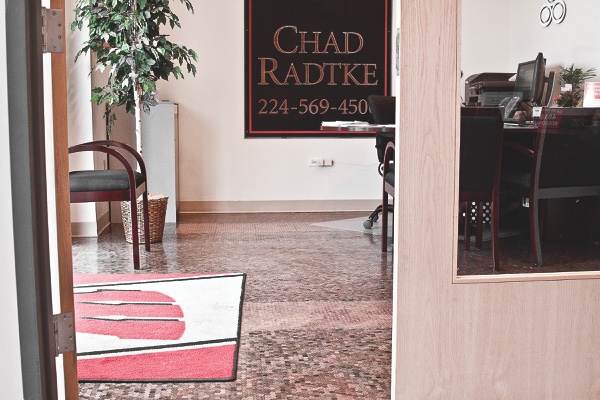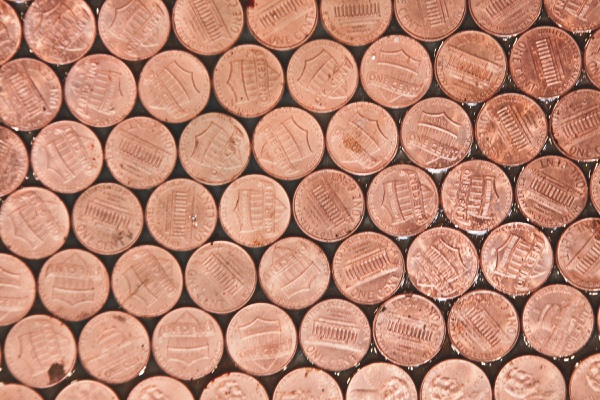When Chad Radtke moved his State Farm office to the west side of Highway 47, he did not know that it would be more than a business pursuit, but a creative one as well.
When contemplating his agency’s move to their new location, Radtke explained that “All of my three daughters wanted to participate in some way in the opening of my new office.”

(Photos by Chris LaPelusa/Sun Day)
The older daughter contributed her innovative wall hanging designs. A second daughter thought up Chad’s new catchy web address (www.gladwithchad.com).
Chad continued, “Then there was my daughter, Olivia. My wife and I knew she had a thing about spending a great deal of time on her iPhone. We set down a rule that she try to use her time to be well-spent. One day, she asked us ‘What was the least expensive way to put down flooring?’ I was surprised to find the answer to be pennies at $2.75 per square foot.”
Radtke, who never hesitated to be “thinking outside the box,” found the idea just made “cents.” He would make his new reception area flooring the office’s focal point!
The Radtkes began researching the innovative project during the month of January. In February, Olivia and Chad began laying down the pennies with the first set of 10 tiles, 12 inches by 18 inches in size. Then to contribute to the “family spirit” of the project, Chad’s parents came down from their home north of Milwaukee and volunteered to add the remaining 90 tiles. By March 8, Chad’s Birthday, the floor with glistening pennies – 51,840 of them. The floor was complete.

But how did the Radtkes achieve it?
The “penny wise” layout chosen by the Radtke family used a YouTube video for instructions: the “M – Mindful Design” series by Lisa Moore.
This cost-effective coin flooring is a multi-step process. It includes choosing appropriately-sized picture frames for the tiles, using clear contact paper to adhere the pennies, and choosing a cleaned, concrete, unobstructed smooth floor to start. The Radtkes made many home decor discoveries along the way.
And how do the Radtkes care for this alternative tile? Radtke explains that the epoxy will become the floor’s protective glaze, meaning, “We use a normal mop to wash the floor.”
Radtke’s experience was both an interior design and history lesson. To cover the office foyer, Radtke and his daughter purchased 1037 rolls of pennies. They used 270 coins per square foot, completing the project for an approximate cost of $520. Each tile took about 25 minutes to put together, totaling about 32 hours total to lay the floor.
Aesthetically, the Radtkes chose a fairly random pattern of pennies for use (heads up/tails down or tails up/heads down) with a few pennies presenting an antique green patina look.
Chad comments that he did separate the older pennies from the shiny ones. In fact, all newer coins were used for the three inlay flooring sections to help offset these areas with a brighter sheen. As the project continued, the Radtkes discovered that, according to superstitious beliefs, it is bad luck in Italy to use the coin’s tails section in an upward position, while it is good luck in China to do so. The family learned that the wheat sign, the Lincoln Memorial, and the present emblem or U.S. shield have been stamped into the coin’s back side through the years depending on when the one cent piece was minted.
The metal content of the penny has also changed through the years. Because of a shortage of copper during World War II, the steel penny came into use. From 1962 until 1982, the alloy used was 95% copper and 5% zinc. However, due to inflation, from 1982 until the present the penny was made of 97.5% zinc and 2.5% copper.
According to Radtke and his secretary, many visitors have asked “Are those real pennies?” while others who walk through the agency’s front door think that the coins are “pennies well spent on insurance.”
At the very least, Radtke feels that his office has definitely shown “It has a cents of humor.”




